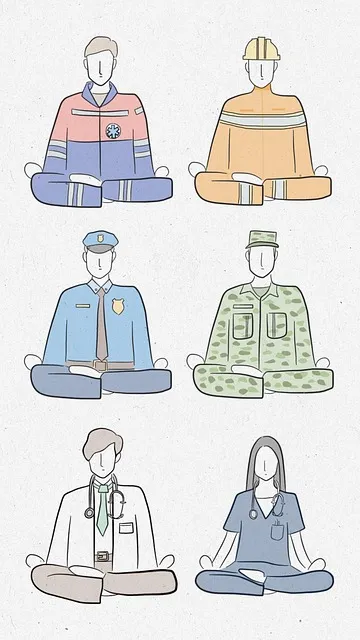Risk assessment and harm minimization planning, led by experts at Kaiser Permanente Mental Health Phone Number Norcal Boulder, prioritize patient safety and well-being. They evaluate individual mental health conditions and environmental factors, implementing personalized strategies like Self-Care Routine Development and Compassion Cultivation from the Mental Wellness Podcast Series. Through comprehensive case reviews, evidence-based practices, and training on stress management techniques, they empower patients and healthcare providers to manage stressors effectively. This holistic approach fosters stigma reduction, enhancing overall risk management and improving quality of life.
Risk assessment and harm minimization planning are essential components of comprehensive mental health care. This article delves into these critical processes, exploring their theoretical foundations and practical applications. We examine the unique role mental health professionals play in risk management and highlight effective strategies for risk assessment and intervention. Through a case study focusing on Kaiser Permanente Mental Health Phone Number Norcal Boulder, we demonstrate how proactive harm minimization planning can transform lives.
- Understanding Risk Assessment and Harm Minimization Planning
- The Role of Mental Health Professionals in Risk Management
- Strategies for Effective Risk Assessment and Interventions
- Kaiser Permanente Mental Health Phone Number Norcal Boulder: A Case Study Approach to Harm Minimization Planning
Understanding Risk Assessment and Harm Minimization Planning

Risk assessment and harm minimization planning are vital components of mental health care, ensuring the safety and well-being of patients. This process involves a thorough evaluation of potential risks associated with an individual’s mental health condition and their environment. By identifying these risks, professionals can implement tailored strategies to minimize harm and promote positive outcomes. It’s a proactive approach that is at the core of effective mental health support.
For instance, organizations like Kaiser Permanente Norcal in Boulder emphasize Mind Over Matter Principles through comprehensive Risk Management Planning for Mental Health Professionals. This involves regularly reviewing patient cases, implementing evidence-based practices, and providing ongoing training on stress management techniques. Such initiatives not only safeguard patients but also empower mental health professionals to deliver high-quality care while mitigating potential risks.
The Role of Mental Health Professionals in Risk Management

Mental health professionals play a pivotal role in risk assessment and harm minimization planning, offering specialized expertise that goes beyond traditional medical care. Organizations like Kaiser Permanente Norcal in Boulder prioritize this aspect, recognizing the profound impact mental wellness has on overall health and safety. These professionals are equipped to identify nuanced risks associated with various challenges, from substance abuse to acute crises. They employ evidence-based practices such as Compassion Cultivation, a component of the Mental Wellness Podcast Series Production, to foster resilience and promote healthy coping mechanisms. By integrating Self-Awareness Exercises into their assessments, they enable individuals to better navigate stressors and make informed decisions regarding their well-being, ultimately contributing to more effective risk management strategies.
Strategies for Effective Risk Assessment and Interventions

Effective risk assessment and harm minimization planning involve a multifaceted approach tailored to individual needs. Organizations like Kaiser Permanente Norcal in Boulder prioritize comprehensive assessments that consider both environmental and personal factors contributing to mental health risks. This includes evaluating access to resources, such as seeking help through the Kaiser Permanente mental health phone number, along with assessing coping mechanisms and support systems.
Interventions are designed based on these assessments, focusing on evidence-based strategies like Self-Care Routine Development for Better Mental Health and Compassion Cultivation Practices. By fostering a culture of mental illness stigma reduction efforts, communities can create supportive environments that encourage individuals to prioritize their well-being. These proactive measures not only mitigate risks but also promote holistic recovery and improved quality of life.
Kaiser Permanente Mental Health Phone Number Norcal Boulder: A Case Study Approach to Harm Minimization Planning

At Kaiser Permanente Mental Health Phone Number Norcal Boulder, a case study approach to harm minimization planning has been proven effective in managing and mitigating potential risks within their community. This method involves an in-depth analysis of past incidents and the development of proactive strategies to prevent future harm. By studying specific cases, such as instances of patient non-compliance or internal conflicts, the team can identify triggers and implement tailored interventions.
The case study approach allows for a comprehensive understanding of complex issues like conflict resolution techniques and mental wellness journaling exercise guidance. Through this process, they’ve successfully integrated mental wellness coaching programs development, fostering a supportive environment that encourages open communication and proactive harm minimization. This holistic strategy ensures that both patients and staff are equipped with the necessary tools to navigate challenging situations effectively.
Risk assessment and harm minimisation planning are essential components of comprehensive mental health care. As demonstrated by the case study of Kaiser Permanente Mental Health Phone Number Norcal Boulder, integrating these strategies allows for proactive interventions that mitigate risks and promote positive outcomes. Mental health professionals play a pivotal role in this process, leveraging their expertise to develop tailored plans that address individual needs. By combining evidence-based practices with compassionate care, we can foster safer environments and enhance the well-being of those seeking support.






